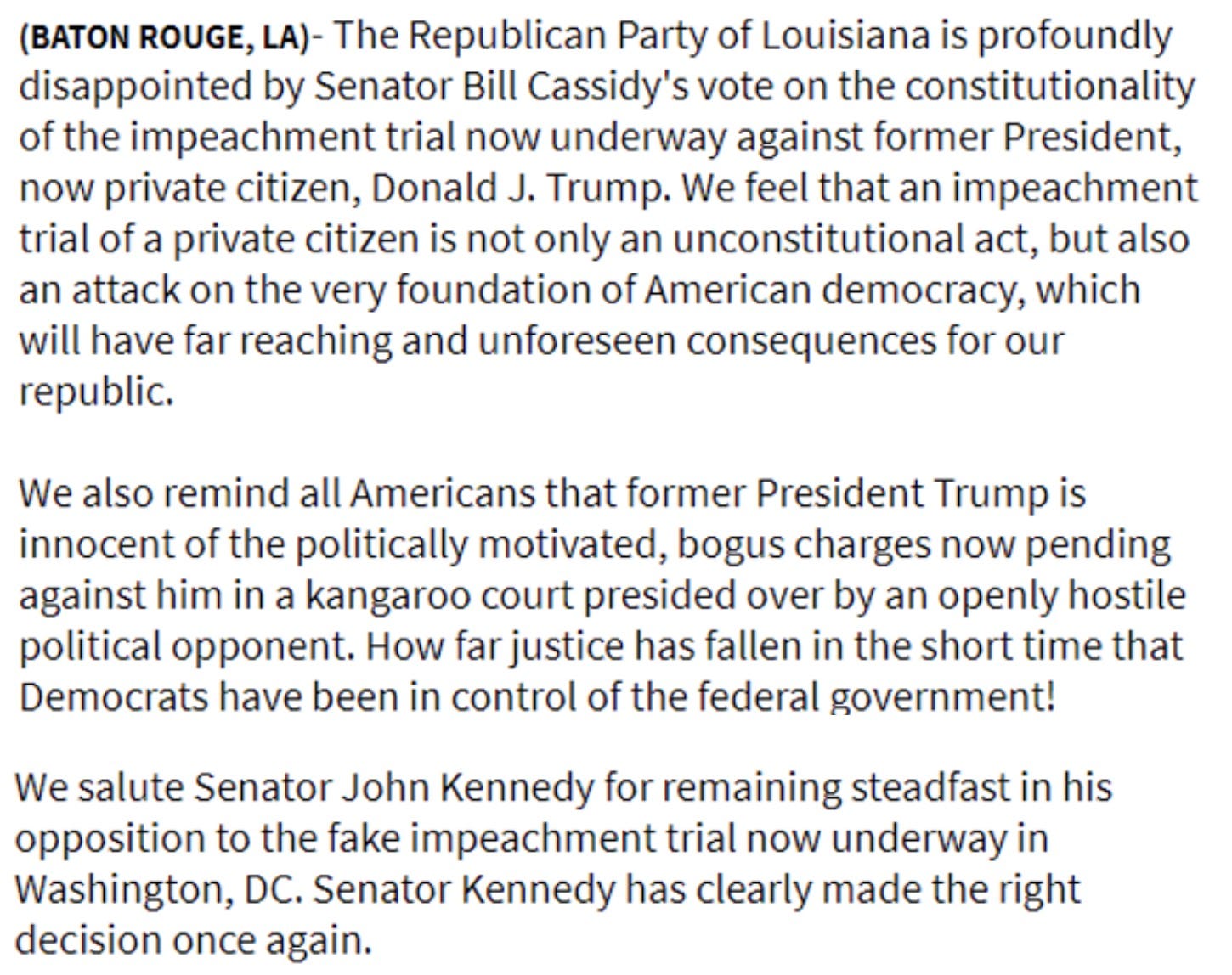
1. The “Good” Republicans
Some conservatives have exited the Trump years convinced that the wisest course of action is to try to salvage the Republican party by working with the “Good Republicans.”
So they prop up guys like Tim Scott and Rob Portman and hold them as contrast to the Devin Nunes - Matt Gaetz - Marjorie Taylor Greene wing of the party.
Here, for instance, is an interview with Rob Portman in which he expresses his Very Sincere Concerns about the constitutionality of impeaching Donald Trump:
Impeachment’s about removal; that’s the focus of impeachment. There’s no question in my mind about that. And that’s why the chief justice didn’t show up, you know, because we’re not removing the president. So I have concerns about that—although I’m listening as a juror; I’ve said from the start I’m not gonna make any decisions till I hear both sides.
Well, Rob Portman listened to both sides at the impeachment trial yesterday. He heard the House managers make a detailed case as to why impeachment of a former president is constitutional, relying on both the law and precedent.
Then Rob Portman heard one Trump lawyer talk about listening to record albums and getting lost in the Capitol. He heard a second Trump lawyer threaten the senators with another Civil War.
And what did Serious Juror and Good Republican Rob Portman do, after hearing from both sides?
He voted to not even go forward with the impeachment trial.
So maybe not much difference between the Good Republicans and the Bad Republicans?
Even the few remaining non-Trumpy conservatives will tell you—at least on background—that Ted Cruz is a Bad Republican. He’s one of the seditionists. A guy who relentlessly pushed the lie that Donald Trump won the election and then voted to overturn our democracy.
Here is Ted Cruz yesterday explaining his view of the impeachment trial:
“The result of this trial is preordained,” Senator Ted Cruz, Republican of Texas, said flatly. “President Trump will be acquitted.”
So Ted Cruz is a Bad Republican and is clearly Not a Serious Juror.
But let’s compare Cruz to another of the Good Republicans, Tim Scott.
Scott is, along with Nikki Haley, the great hope for a post-Trump GOP. And here is what Tim Scott told Axios yesterday after hearing from both sides and—like Cruz—voting not to proceed with the trial:
"Not a single thing will change," Sen. Tim Scott (R-S.C.) told Axios. "The outcome is set."
Huh. Weird.
The Good Republicans are as openly indifferent to argument and evidence as the Bad Republicans. Like the Bad Republicans, they don’t even feel the need to pretend to be objective. And at the end of the day, they vote the same way as the Bad Republicans, too.
So maybe pinning your hopes for rebuilding a non-authoritarian political party around these guys isn’t going to work out so good. The few remaining non-Trumpy conservatives might want to come up with another plan.
We have a plan at The Bulwark, btw. It’s telling the truth. No defining deviancy down—Republican X doesn’t actively promote Q so he’s okay! No make-pretend about who is on the side of the angels and what the stakes are here.
2. The State of the States
I’m being, as the fusty conservatives of yesteryear might have put it, a bit churlish. Because there were six Good Republicans yesterday—they are the ones who voted to proceed with the trial. Not to convict Trump, mind you, but simply to carry out the Senate’s duty as enumerated in the Constitution. It really shouldn’t have been that big of an ask; but whatevs.
One of those six was Louisiana Senator Bill Cassidy, who had the temerity to change his position. Cassidy, it turned out, actually listened to both sides and was willing to say out loud that one side made a convincing argument while the other side rambled and made threats.
For his trouble, a couple hours after the vote Cassidy was rebuked by the Louisiana state GOP. You should read their entire statement. It’s a doozy.
“Innocent of the politically motivated, bogus charges now pending against him in a kangaroo court.”
That line wouldn’t be out of place on OANN or Newsmax.
And it’s perfectly in keeping with what we’re seeing from state-level Republican organizations across this great land of ours:
In Texas, the state GOP adopted a QAnon slogan and the party chairman is actively talking about secession.
The chair of the Wyoming GOP is talking about seceding from the Union, too. Also: The state party censured Liz Cheney for voting for the article of impeachment.
The Arizona state GOP voted to censure Republican governor Doug Ducey, Cindy McCain, and former senator Jeff Flake for general enemy-of-the-people stuff.
The Nebraska state Republicans are pursuing censure against Ben Sasse for the specific charge of having voted that it was constitutional to conduct an impeachment trial.
The Hawaiian Republican party is openly sympathetic to QAnon.
The Oregon Republican party published a resolution claiming that the January 6 Capitol attack was a “false flag” operation designed to hurt Donald Trump.
The states are the laboratories of democracy, sure.
But over the last 150 years we’ve forgotten that they can also act as laboratories of anti-democratic authoritarianism.
Never forget that the “guardrails of democracy” aren’t machines that go on their own. The “guardrails of democracy” are people. And if we don’t work to keep our democracy, we will lose it.
3. MOAR Bitcoin!
I can’t get enough of longform pieces about the world of guys who are deep into crypto:
In 2015, Agustín took a sabbatical from work with the aim of reinventing himself as an artist. He had studied engineering at the Buenos Aires Institute of Technology, or ITBA, and was making good money as a developer for an Argentine telecommunications company, but he felt trapped in corporate culture. As luck would have it, he heard about some ITBA alums who had transformed a building into a “crazy hacker haven” for cryptocurrency projects. The founders were on the same spiritual journey as Agustín. After a meeting and a short deliberation, the members of Voltaire House invited Agustín to be their artist-in-residence. . . .
“The house itself was a project,” said Sacha Lifszyc, a visitor during those years. For the few young programmers in Buenos Aires lucky enough to be extended an invitation, going to Voltaire House was like entering a refuge where everything contained the potential for innovation. From the outset, its members were famously secretive: There’s scarcely any digital footprint of the talks and parties they hosted, and Voltaire’s events and public discussions were promoted boca en boca. Aside from a Medium article in 2017, Voltaire House avoided media coverage. All of its key members dodged interview requests for this story, making it clear through intermediaries that they weren’t interested, and strongly discouraged others from speaking. “This ethos of being anonymous really resonates with them,” said Agustín Ferreira, a coder who was friends with many in the house. “Like being Satoshi, you know?” . . .
House members would congregate around a big table framed by a giant statue of the letter “V” or gather in the little back garden for cookouts. During these years, members were constantly tinkering. A visitor recalled how they had outfitted a small room with VR sensors and once tried to install a system that would play customized music for each person who entered the house.
This early experimentation would lead to Voltaire House’s highest-profile creation: Decentraland, a VR metaverse powered by the Ethereum blockchain with its own crypto token.To put it in layman’s terms, Decentraland was a virtual world with a limited number of properties that people could buy through a proprietary currency and sell for real money. It was a petri dish for the ideals of democracy and decentralization they championed, built on the premise that a virtual world controlled by its own “citizens” could more effectively govern itself — and offer more stable investment opportunities — than a real one governed by elites. Decentraland’s founders stipulated that it would be overseen by a “Decentralized Autonomous Organization,” a group of Decentraland residents who would vote on management decisions.



